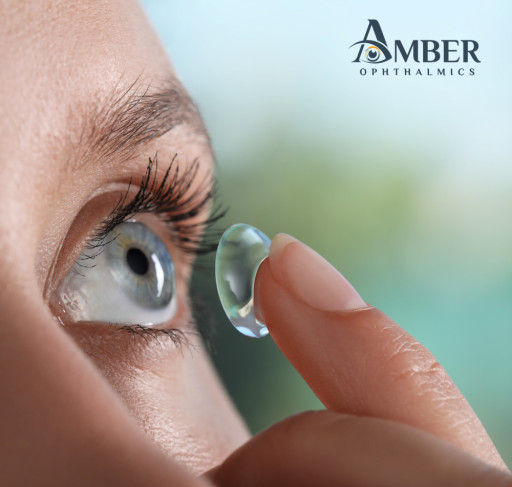SAN DIEGO, August 18, 2023 (Newswire.com) - Amber Ophthalmics, Inc. (Amber), a privately held, clinical stage biopharmaceutical company, announced today that Dr. Mark S. Gorovoy from Gorovoy M.D. Eye Specialists has enrolled the first patient in the AMB-01-006 (NEXPEDE-1) study. The NEXPEDE-1 study is a randomized, double-masked, vehicle-controlled Phase 2/3 clinical trial designed to evaluate two concentrations of Nexagon® (lufepirsen ophthalmic gel) for the treatment of persistent corneal epithelial defects (PCED) (ClinicalTrials.gov identifier: NCT05966493).
This study evaluates the safety and efficacy of Nexagon, in a dosing regimen that utilizes as few as five topical in-office administrations for subjects with confirmed non-infectious PCED. Subjects who do not re-epithelialize within the first four weeks of treatment will continue to receive weekly administrations until subjects either achieve re-epithelialization or complete eight weeks of therapy. The primary endpoint for the NEXPEDE-1 study will be complete corneal healing as determined by corneal fluorescein staining.
"We are excited to have enrolled the first subject into the NEXPEDE-1 study and are fortunate to have a strong contingency of clinical sites dedicated to the treatment of PCED," said Dr. Shawn A. Scranton, President and CSO of Amber. "We look to expeditiously complete this study, as it will further guide the development of this first-in-class PCED therapy that we believe can address a variety of the underlying PCED etiologies."
LUFEPIRSEN OPHTHALMIC GEL (NEXAGON) is a patent-protected, unmodified antisense oligonucleotide that inhibits connexin43 protein translation, a cell membrane hemichannel forming protein associated with ocular inflammation and progression of PCED disease pathology. As a result of Nexagon's unique mechanism of action, the medication may be administered topically in the office by the physician at a frequency far less than the current treatment paradigm consisting of multiple daily patient-administered drops.
ABOUT AMBER OPHTHALMICS
Amber Ophthalmics, Inc. is a privately held, clinical-stage biopharmaceutical company focused on innovative therapies for rare ophthalmic diseases. We are committed to addressing unmet medical needs for the restoration, preservation and improvement of patient vision and quality of life. For more information, visit amberophthalmics.com or LinkedIn for updates.
ABOUT PERSISTENT CORNEAL EPITHELIAL DEFECTS (PCED)
PCED is a rare and progressive disease impacting ~100,000 patients in the United States per year that arises from the failure of corneal re-epithelialization within 10-14 days of a corneal insult, even with the use of standard supportive treatment. Despite treatment, and regardless of underlying etiology if progression is not halted, PCED can result in corneal scarring, vascularization and/or severe vision loss. There are currently no FDA-approved therapies for the treatment of PCED, with many patients progressing to corneal transplant.
Contact Information:Jill Jene, PhD
CBO, Amber Ophthalmics
[email protected]
Original Source: Amber Ophthalmics Announces First Patient Enrolled in NEXPEDE-1, a Phase 2/3 Clinical Trial Evaluating Nexagon for the Treatment of Persistent Corneal Epithelial Defects




